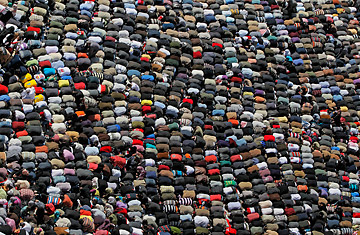
Tens of thousands of Egyptians gather during celebrations of Hosni Mubarak's fall from power to pray — and to maintain pressure on the current military rulers — in Tahrir Square in Cairo on Feb. 18, 2011
(2 of 3)
Worshipers listened intently, some fashioning hats out of a newspaper that listed the "100 most corrupt" in Mubarak's regime, while others used the ubiquitous Egyptian flags on sale for $1 around the square to shield themselves from the hot sun. After the sermon, the massive crowd broke out into several chants of "The people want the purification of the country" and "Not Hosni or his regime, not his party or its members."
"It was a very good speech, especially the part about the unity between Christians and Muslims," said Abdullah, a cameraman and Muslim Brotherhood supporter who spent the past 19 years in self-imposed exile in Saudi Arabia and returned just last week. "I am honored to have heard Sheik Qaradawi here, in this square blessed by the blood of young martyrs."
Across town, in the neighborhood of Mohandiseen, several hundred Mubarak supporters gathered to hold their own rally to honor the ousted leader. "Mubarak, we love you. We will never forget you," they chanted. It was a largely melancholic mood, in contrast to the upbeat, vibrant atmosphere in Tahrir.
Dubbed a day of celebration and mourning for the hundreds killed in the 18-day rebellion, Friday's Tahrir gathering was family-friendly and festive. Parents hoisted children atop the dozens of sand-colored tanks parked along the periphery of the square, clicking away on digital cameras and asking soldiers to pose. Popcorn stands dotted the square, as did volunteers painting the red, white and black stripes of the national flag onto faces. Soldiers handed out paper flags to children, while vendors at makeshift stalls hawked nationalist memorabilia.
The rally was an opportunity for the widely disparate antigovernment groups, as well as regular citizens, to remind the country's transitional leaders that the revolution's demands have not all been met. Handwritten placards and banners demanded everything from the abolition of military courts for civilians to increased wages to reduction of corruption. Elsewhere, clumps of people danced and sang along to vastly popular songs like "I Love You Egypt" blaring from radios.
